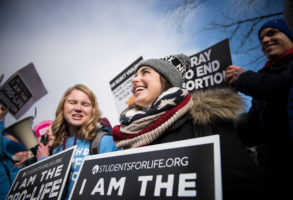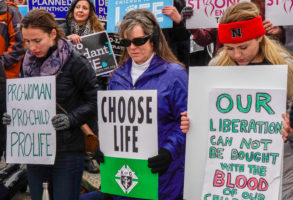Erika Bachiochi
Fellow
EPPC Fellow Erika Bachiochi is a legal scholar specializing in Equal Protection jurisprudence, feminist legal theory, Catholic social teaching, and sexual ethics. She is also a Senior Fellow at the Abigail Adams Institute in Cambridge, MA, where she founded and directs the Wollstonecraft Project. Her newest book, The Rights of Women: Reclaiming a Lost Vision, was published by Notre Dame University Press in 2021.
EPPC Fellow Erika Bachiochi is a legal scholar specializing in Equal Protection jurisprudence, feminist legal theory, Catholic social teaching, and sexual ethics. A 2018 visiting scholar at Harvard Law School, she is also a Senior Fellow at the Abigail Adams Institute in Cambridge, MA, where she founded and directs the Wollstonecraft Project. Her newest book, The Rights of Women: Reclaiming a Lost Vision, was published by Notre Dame University Press in 2021, and was named a finalist for the Intercollegiate Studies Institute’s 2022 Conservative Book of the Year award.
Ms. Bachiochi’s essays have appeared in publications such as the Harvard Journal of Law and Public Policy, Christian Bioethics (Oxford University), The New York Times, The Atlantic, First Things, CNN.com, National Review Online, National Affairs, Claremont Review of Books, SCOTUSblog, and Public Discourse. She is the editor of two books, Women, Sex & the Church: A Case for Catholic Teaching (Pauline Books & Media, 2010) and The Cost of “Choice”: Women Evaluate the Impact of Abortion (Encounter Books, 2004).
Ms. Bachiochi serves on the Advisory Boards of the Common Good Project, the Catholic Women’s Forum, the Susan B. Anthony Birthplace Museum, St. Thomas More Academy (South Bend), EthicsFinder, and the Center for the Law and the Human Person at the Catholic University of America. She is a co-founder of St. Benedict Classical Academy in Natick, MA, where she served as President of the Board from 2013–2015.
I Couldn’t Vote for Trump, but I’m Grateful for His Supreme Court Picks
Erika Bachiochi

If Roe goes, the pro-life movement can begin where it left off in 1973, working to convince fellow citizens (especially in blue states like mine) that we owe dependent and vulnerable unborn children what every human being is due: hospitality, respect and care.
Articles
The New York Times / December 7, 2021
An Argument for a Revised Feminism, Rooted in a Correct Anthropology
Carl R. Trueman

At the heart of Erika Bachiochi’s The Rights of Women: Reclaiming a Lost Vision is the assertion that human beings are not defined by autonomy but rather by relations of dependency and obligation.
Articles
The Catholic World Report / November 26, 2021
Women Do Not ‘Rely’ on Abortion
Erika Bachiochi

Roe v. Wade and Planned Parenthood v. Casey hang by the thin thread of “reliance.” Chip away at Casey’s assertion that women rely on abortion for their participation in economic and social life, and there is not much left of the cases that have distorted constitutional interpretation and held U.S. politics hostage for nearly 50 years.
Articles
National Review - November 29, 2021 issue / November 18, 2021
The Feminist Revolution Has Stalled. Blame Roe v. Wade.
Erika Bachiochi

If the “gender revolution” has stalled—elevating women in the workplace without a concomitant elevation for the work mothers and fathers do in the home—constitutionalizing the right to abortion shares a good deal of the blame.
Articles
America Magazine / November 1, 2021
Early Claims for Joint Property
Erika Bachiochi

In this excerpt adapted from her book The Rights of Women: Reclaiming a Lost Vision, EPPC Fellow Erika Bachiochi writes about women’s early joint property rights claims and the value of the work of the home, tracing Mary Wollstonecraft’s argument that such work affords the character development men, women, and children need for true success in the public sphere, which provides a renewed rationale for family policy today.
Articles
Journal of Christian Legal Thought / October 21, 2021
Abortion Rights and Women’s Equal Citizenship
Erika Bachiochi

The time has come instead to discard the male-normative theories of equality on which the putative right to abortion is constructed today. Instead, let’s make room, as earlier generations of women’s rights advocates did, for vulnerable and dependent children, and for the women—and men—responsible for their care.
Articles
Newsweek / September 1, 2021
Women, Families, and the Ends of Freedom
Erika Bachiochi

Women and men ought to enjoy political rights by virtue of their common human nature, but such rights are not individualistic means for self-actualization.
Articles
Law and Liberty / August 17, 2021
INTERVIEW: Erika Bachiochi Says Abortion Is Anathema to Authentic Feminism, Deviation From Women’s Movement’s Origins
Erika Bachiochi
In an interview with Fox News, EPPC Fellow Erika Bachiochi discusses her call to reimagine ‘feminism anew: a feminism in search of human excellence.’
Fox News / August 13, 2021
INTERVIEW: What Would Founding Feminist Say to Women’s Movement Today?
Erika Bachiochi

EPPC Fellow Erika Bachiochi talks with Crux about her new book, The Rights of Women: Reclaiming a Lost Vision.
Articles
Crux / July 22, 2021
Reclaiming a Lost Vision of the Rights of Women
Erika Bachiochi

The philosophical and political principle of equal citizenship for women has morphed in the last half century into something that nearly contradicts its original moral vision, a vision first fully articulated by English philosopher Mary Wollstonecraft in A Vindication of the Rights of Woman more than two centuries ago.
Articles
Church Life Journal / July 19, 2021
Reclaiming Feminism from the Logic of the Market
Erika Bachiochi

All human beings are created with equal dignity and worth. But such dignity finds its true nobility when, as earlier women’s rights advocates well understood, each of us is encouraged and empowered by our families and our communities to seek moral excellence in all we do.
Articles
Newsweek / July 15, 2021
